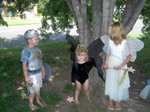Hi Leann!
Attached is what your letter says, although the last four lines (in italics) on page 4 still confuse me a little. It has something to do with the Turks or the Russians destroying German-speaking colonies in the south, but what you see there is what I *think* it says. Hope this is helpful.
Rudi
Rudi has a couple of very interesting websites, I would encourage you to visit them...



 I'm still not sure how the people in this letter are related, I need to print it out and send it to my dad's cousin to see if he might know.
I'm still not sure how the people in this letter are related, I need to print it out and send it to my dad's cousin to see if he might know.I have a few corrections that could be made (not in any particular order):
Kornelischen is actually Kornelische (Mrs. Kornels)
Neifeldsche is Mrs. Neifeld (Neufeld is a common Mennonite surname)
Siemanschenon [?]'s wife is Siemensche von der ... (I can't read the next word)
Siemon is Siemens (a common Mennonite surname)
Willams is actually Willems (this is a well known Mennonite surname)
In the context of the letter Wirtschaft refers to the Friesen's farm
Herbusen probably refers to watermelons (we called them rabusen)
Before the first reference to Harbusen there is a word which I can't read which I am sure is incorrectly translated as Clearing. I'm sure that this should be translated as a vegetable or other garden product. Someone else who has a better knowledge of German may recognize the word with that in mind.
Gerstein is actually Gertzen (a common Mennonite surname)
Ohm does not mean General. It is Dutch for uncle but is often used as a term of respect usually for a minister of the church. I found this mis-translation rather funny considering some of the Ohms I've known. The names following Ohm are Sawazki and Isak (Isaak), two well known Mennonite surnames. Rikkenau refers to Rueckenau,.
To my knowledge there was only one Rueckenau in Russia, which was in the Molotschna Colony. Perhaps someone can correct me on that.
Gerdhrud is actually Gerdhard which should be Gerhard.
Glenn Penner
Not strictly genealogy, but we need the language to do it.













4 comments:
Very cool and an interesting piece of history.
Hi, Bob! I just wish I had the envelope it came in.
Hi! What a fantastic insight into your family history. If only I had the resources to look back that far and see what my relatives and there friends got up to!
I worked with a Heinrich many moons ago at Blacktown (Sydney). Do you have any relatives over here?
Take Care,
Peter
Hi! I received your great message. You have certainly gone to a lot of trouble and I am extremely grateful. I'll let you know how I get on with the info you have given me.
Thanks a million
Peter
Post a Comment